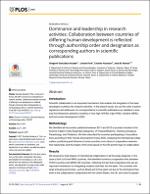| dc.contributor.author | González Alcaide, Gregorio | |
| dc.contributor.author | Park, Jinseo | |
| dc.contributor.author | Charles, Huamaní | |
| dc.contributor.author | Ramos, José M. | |
| dc.date.accessioned | 2019-05-16T22:05:56Z | |
| dc.date.available | 2019-05-16T22:05:56Z | |
| dc.date.issued | 2017-08 | |
| dc.identifier.citation | Plos One. 2017; 12(8). | es_PE |
| dc.identifier.issn | 1932-6203 | |
| dc.identifier.uri | https://hdl.handle.net/20.500.12959/545 | |
| dc.description | El Consejo Editorial es un equipo de expertos en el campo de la revista. | |
| dc.description.abstract | La colaboración científica es un importante mecanismo que posibilita la integración de los países de menor desarrollo en actividades de investigación. En este estudio se utiliza el orden del autor y las direcciones de correspondencia de las publicaciones científicas como variables para analizar las interacciones entre los países de muy alto, alto, mediano y bajo desarrollo humano. Se observó un alto nivel de colaboración internacional en todas las áreas analizadas en el caso de los países de mediano y bajo desarrollo. Se identificó numerosos enlaces de cooperación entre los países de muy alto, mediano y bajo desarrollo humano, reflejando que los enlaces de cooperación son un importante mecanismo para integrar las actividades de investigación. Los países con grandes economías emergentes, como Brasil y China, sobresalen debido al dominio que ellos ejercen en las colaboraciones establecidas con los Estados Unidos, el Reino Unido y otros países de Europa. El análisis del rol de liderazgo de los países medido por la frecuencia de encabezamiento de la autoría mostró la limitada participación delos países de mediano y bajo desarrollo. Se observó diferencias estadísticas significativas en el nivel de citación de autoría de acuerdo con el índice de desarrollo humano de los países participantes. | es_PE |
| dc.description.abstract | Introduction
Scientific collaboration is an important mechanism that enables the integration of the least
developed countries into research activities. In the present study, we use the order of author
signatures and addresses for correspondence in scientific publications as variables to analyze the interactions between countries of very high (VHHD), high (HHD), medium (MHD),
and low human development (LHD).
Methodology
We identified all documents published between 2011 and 2015 in journals included in the
Science Citation Index-Expanded categories’ of Tropical Medicine, Infectious Diseases,
Parasitology, and Pediatrics. We then classified the countries participating in the publications according to their Human Development Index (HDI), analyzing the international collaboration; positioning and influence of some countries over others in cooperative networks;
their leadership; and the impact of the work based on the HDI and the type of collaboration.
Results
We observed a high degree of international collaboration in all the areas analyzed, in the
case of both LHD and MHD countries. We identified numerous cooperative links between
VHHD countries and MHD/LHD countries, reflecting the fact that cooperative links are an
important mechanism for integrating research activities into the latter. The countries with
large emerging economies, such as Brazil and China stand out due to the dominance they
exert in the collaborations established with the United States, the UK, and other European countries. The analysis of the leadership role of the countries, measured by the frequency of
lead authorships, shows limited participation by MHD/LHD countries. This reduced participation among less developed countries is further accentuated by their limited presence in
the addresses for correspondence. We observed significant statistical differences in the
degree of citation according to the HDI of the participating countries.
Conclusions
The order of signatures and the address for correspondence in scientific publications are
bibliographic characteristics that facilitate a precise, in-depth analysis of cooperative practices and their associations with concepts like dominance or leadership. This is useful to
monitor the existing balance in research participation in health research publications. | |
| dc.format | application/pdf | es_PE |
| dc.language.iso | eng | es_PE |
| dc.publisher | Editorial Board | es_PE |
| dc.relation.uri | https://journals.plos.org/plosone/article?id=10.1371/journal.pone.0182513 | |
| dc.rights | info:eu-repo/semantics/openAccess | es_PE |
| dc.rights.uri | https://creativecommons.org/licenses/by-nc-nd/4.0/ | es_PE |
| dc.source | Seguro Social de Salud (EsSalud) | es_PE |
| dc.source | Repositorio Institucional EsSalud | es_PE |
| dc.subject | Ciencias Médicas y de Salud | es_PE |
| dc.subject | Investigación | es_PE |
| dc.subject | Liderazgo | es_PE |
| dc.title | Dominance and leadership in research activities: collaboration between countries of differing human development is reflected through authorship order and designation as corresponding authors in scientific publications. | es_PE |
| dc.type | info:eu-repo/semantics/article | es_PE |
| dc.subject.ocde | https://purl.org/pe-repo/ocde/ford#3.03.02 | es_PE |
| dc.publisher.country | PE | es_PE |
| dc.identifier.doi | https://doi.org/10.1371/journal.pone.0182513 | |






